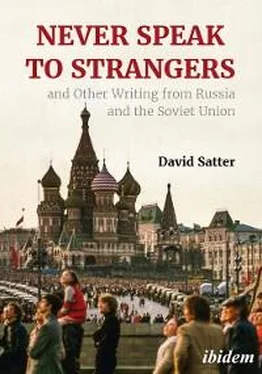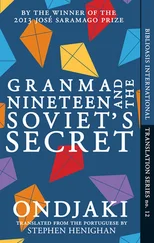The disorganised state of the dissident movement today comes as a particular irony since it was the 1975 Helsinki agreements with their clear pledges to respect human rights and facilitate the free flow of information which last year gave the movement new life. The Soviet Union is anxious to sign human rights commitments in keeping with its world stature but, for internal reasons, reluctant to honour them. The dissident Helsinki monitoring group, which was founded by veteran dissidents last year, for the first time managed to unite all the principal strands of Soviet dissent—the democratic movement, the Jewish emigration movement, the religious rights movement—into an organisation dedicated to taking the Soviet Union at its liberal word. From the Soviet point of view, the group probably had to be repressed to ward off independent pressure on the Soviet Government to honour its international commitments emanating from within the country.
The dissident, movement may enter a period of relative inactivity in the months ahead. The Helsinki group in Moscow it still functioning but has only four members and there is widespread apprehension about the expected trials of Dr. Orlov, Mr. Ginzburg and Mr. Shcharansky.
The forces which produce new dissidents, however, continue to operate. Sergei Polikanov, a nuclear physicist and corresponding member of the Soviet Academy of Sciences held a Press conference recently to protest the refusal of the authorities to allow his family to accompany him for a year of research at a nuclear laboratory in Geneva. By speaking out against the kind of harassment to which almost all Soviet scientists are subjected, Professor Polikanov put his career at risk and took the first step toward one day joining the ranks of those active dissidents whose numbers in Moscow are so depleted now.
Financial Times, Thursday, December 8, 1977
Soviet intellectuals are not the only ones being hounded
“We are a vast army of Soviet unemployed, thrown out of the gates of Soviet enterprises for attempting to exercise the right to complain, the right to criticise, the right to freedom of speech.”
So begins an open letter by 72 working people from 42 cities who lost their jobs for protesting against bad working conditions and corruption. The letter and the testimony of several representatives of the group in Moscow cast doubt on the view that, although ideological criticism is barred in the Soviet Union, it is possible for the individual worker to voice objections to specific industrial practices.
“We undertook to offer publicly,” the open letter said, “critical remarks against the plundering of socialist property, bad conditions of work, low pay, high injury rates, the raising of production norms leading to waste and low quality production.”
Seven representatives of the signatories recently met with foreign correspondents in an apartment in a new district on the outskirts of Moscow where they described their personal experiences. They insisted they are not “dissidents” but rather working people concerned to correct specific injustices. They supplemented their personal stories with documentation of other cases and copies of appeals to State and party organisations, as well as a second letter, protesting recent repression against complainants, addressed to the Soviet Press.
The working people at the Moscow meeting said the 72 signatories met each other while seeking hearings for their individual complaints in the reception hall of the Soviet Procurator, the Communist Party central committee, and the Supreme Soviet, the Soviet Parliament. These halls are the scenes of considerable tension because, according to the letter to the Soviet Press, “it is difficult to foresee in advance who among those waiting will be seized” and taken to the militia station, or for a “conversation” with the admitting doctor at a mental hospital.
The workers said they began to organise their efforts after discussion in the crowded halls convinced those present that their similar individual problems had more than a “private character.” The following cases, related to correspondents by workers present at the recent meeting and taken from the documents the workers’ group provided, cannot be verified under Soviet conditions. The signers, however, took a considerable risk by making them public and insist they are representative of the fate of thousands of individuals in the USSR who openly challenge industrial abuses.
Vladimir Klebanov (45), of Makeevka in the Donetsk industrial district, told correspondents that he worked in the Bazhanova coal mine for 16 years. He became concerned about excessive overtime at plan fulfilment time which frequently meant that men worked 12 hours a day instead of the standard six-hour coal miner’s shift, contributing to between 12 and 15 deaths and 700 injuries a year, which, he said, was considered “normal.”
Mr. Klebanov said that in 1968, after he became a shift foreman, he refused to require overtime of his men or to send them into the mine when safety equipment was missing or broken. He was charged with slandering the State and committed to a mental hospital.
Mr. Klebanov is the leader and principal organiser of the “worker-dissidents” and the documents he and others distributed at the meeting described industrial abuses that, in the West, would have been combated by a labour union.
These included the cases of Natalia Matyusheva, who worked as a hostess in a pension in Gorki and was sacked for “truancy” after protesting publicly about the death of a motorist which she said was the fault of the resort doctor, and Maria Melenteva, who lost her job for seeking a pension after 27 years of arduous labour.
Soviet unions exist on a per industry basis but they are run by the Communist Party which arranges the appointment or election of officials. These officials arrange special services such as paid holidays, but also aid management in meeting production quotas and maintaining discipline. The victims of industrial abuses appear to have no recourse.
Anatoli Poznyakov (39), worked as a locksmith for Roubles 75 (£58) a month. He told correspondents at the meeting that when he asked for a rise, he was insulted and after appealing to the local party organisation, told that his destiny in life was “to eat from a pig’s trough.” Further appeals led to his dismissal and he now lives on a semi-disability pension of Roubles 21 a month (he is an epileptic) and his mother’s pension of Roubles 45 a month.
Nedzhda Kurakin told correspondents she had worked for 25 years in a “closed restaurant in Volgograd.” She said restaurant managers were docking her pay and that of other waitresses for fictitious broken crockery and then ordering new crockery for themselves. In 1975, she made these charges at a party meeting and was fired for shirking. She said the Volgograd party leader she had known for 20 years refused to see her and she has been unable to find a job since.
Many of the industrial grievances described to correspondents or mentioned in the documents, like that of Mrs. Kurakin, concerned cases of organised corruption or theft, known to be serious and a growing problem for Soviet industry. Even in such cases, however, the response of Soviet institutions, including legal institutions, appeared to be instinctive support for existing authority.
Valentin Poplavsky (44), formerly head of the maintenance department for company housing at a factory in Klimovsk outside Moscow, said he was sacked after refusing to write a reprimand into the work record of a woman who protested about the use of company funds for drinking parties. To silence his vehement protests against the firing, he said the militia, acting on his ex-director’s instructions, entered his apartment and beat him in front of his wife, children, and 97-year-old father. When he tried to file a complaint at the prosecutor’s office, he was given a 15-day jail sentence and shortly afterward, his wife was fired from the job she held for 18 years.
Читать дальше












